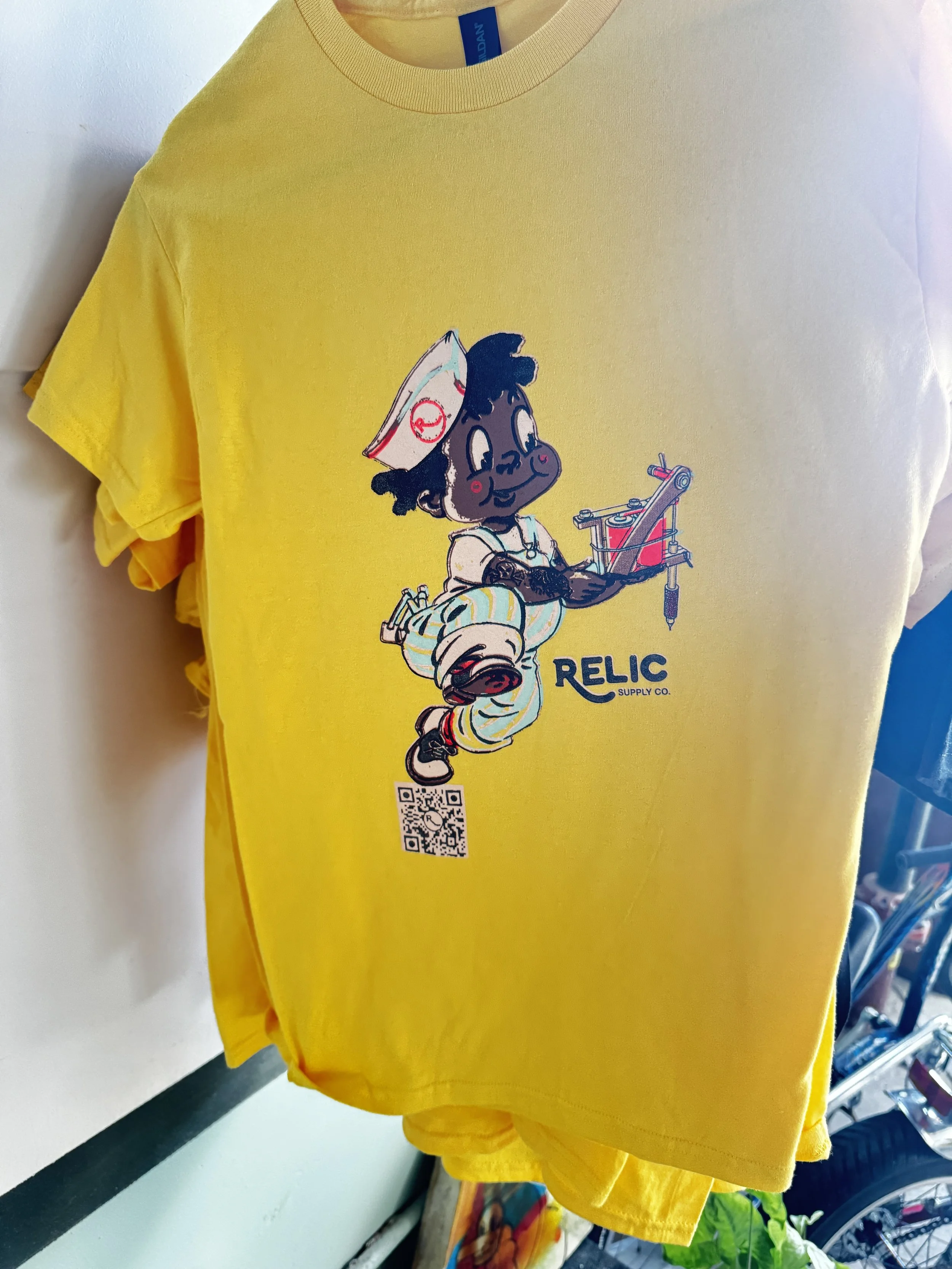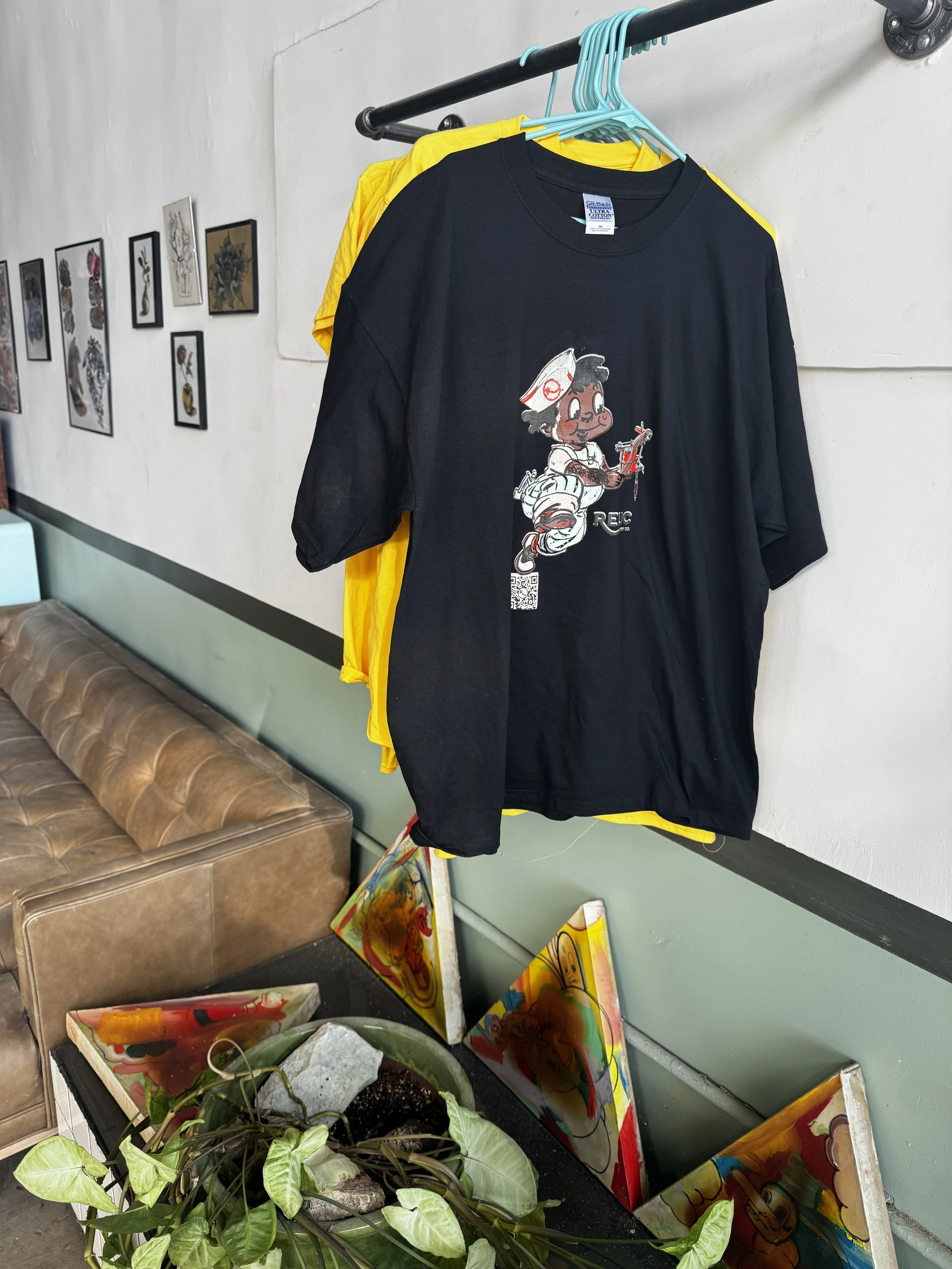What’s behind the ‘Best Boy’ t-shirt?
Behind everything we create is a concept, a meaning.
Below is an interview with ‘Best Boy’ t-shirt designer and printer, Mark, on what his inspirations were for this shirt and little about his screen-printing story:
We’ve done a lot of shirt designs over the years. We’ve never done a deep dive into what they mean to us. What’s the meaning behind this new Relic t-shirt?
Mark: Originally, I was thinking about Afro Futurism and how cool it is for people to think of you know, like sci-fi futuristic-like ideas. I like and respect old school cars and machinery and art styles and traditional disciplines within the arts.
One of my favorite time periods, design wise is 1900 to like 1969 and I always thought the old school diner look was really attractive or appealing to the eye.
So I was just wondering, you know, how could we do something in that style. And then I read an article about Frisch's Big Boy, which is a hamburger chain. Their logo or the mascot inspired me.
And I was just like, well, I'd love to steal that and uh customize it a bit. I mean, you know, theft is common in the arts, so I was kind of looking for something to steal and change that would be striking. So I came up with this image that I think of as the ‘best boy’ instead of ‘big boy’, but, you know, it's just a fun little character.
It's not necessary necessarily our logo or anything.
So it was just something fun to play with that I think represents like a youthfulness - a playfulness. But also like points back to some aesthetics that are really pleasing.
You said afro-futurism and old school aesthetics. How do these two things fit in this image?
Mark: On the surface, I guess they don't, but, they do in my mind because I think that it's kind of like, I don't know if people will get like the video game reference, if they haven't played it, but like in Fallout, there's this futuristic feel to it, but it's really like an alternate timeline. And I think ...
The experiment of it is, what if there was an alternate timeline where in the 50s or before the, you know, 1920s, what if there wasn't any racism?
You know, like, what if there was a giant chain of burger spots that were, you know, in this alternate timeline where there wasn't such a divide in communities, where you could have like…I mean, don't get me wrong, there was businesses, all races and stuff had businesses, but there was a lot of segregation going on.
And I've always kind of like imagined, what would it be like to be able to experience going to clubs and public spaces, you know, back in the day with, bullet shaped cars, really round art Deco style cars and architecture and not have to think of the negative part of those time periods in history.
I like the art and stuff, but I understand that at least, my grandparents and their parents were going through a lot of, you know, social tensions at that time.
So when I think of Afro Futurism, the way that I would go about it would be more of like an alternate timeline that stemmed from like this golden age of the early 1900s where we had already solved all the racial stuff and maybe we've already solved all the prejudices between male and female and all the different, you know, genders and, you know, all of that stuff has already been solved.
And we could just enjoy the American culture that we have, you know. But, yeah.
I'd like to add to that that you know of course this is just a a T-shirt design, um if I had the ability to like make a whole graphic novel around the idea that inspired the t-shirt, you know, I could probably flush out this whole like background story and stuff. I don't know if it'll evolve to anything beyond the t-shirt.
How long have you been screen-printing?
Mark: I did screen print these by hand myself upstairs on the third floor of the Relic building in the print-making area. Been screen printing almost as long as I've been tattooing, like almost 20 years. It was also important to make it ourselves, kind of like a gift to people that have gotten tattooed by us, and folks that have done shows in our locations.
Relic is all about traditional crafts.
I believe that's where the term Relic fits into our business and our business model. The reason why we're called Relic Supply is all of the traditional crafts that we learned in art school, um and are applying to you know, our daily lives in these modern times with all the digital stuff, we're still actually printing stuff by hand, screen printing, you know, doing block prints, cutting things with hand saws and smoothing them out with planes and, you know, drawing on paper.
It's kind of weird to say that like it's something special, you know, it’s weird. I guess I still remember time before iPads. And I mean, I love using Procreate. Don't get me wrong, but there's something very special about the textiles, like the touchy feely-ness of being able to use a pencil on paper and work it all the way up to something that’s like a T-shirt.
So I don't know if I answered the question directly or not…
What kind of screen-printing setup do you have?
Mark: Um, we are we're using , uh a Riso Gocco Pro, uh 200 or QS 200 or whatever, screen burner, which is how we put the images onto the screens that we use to print the T-shirts.
That's not 100% traditional. We still have screens with emulsion on them, which is like the old school way, or one of the old school ways of printing. But it's still like, you know, it's still hand done.
And whenever we're teaching workshops, we're still using the emulsion stuff, but one cool thing about the Gocco Pro is that we're able to create the images without having a lot of waste and run-off that's bad for the environment.
We're able to use plant-based inks as well as eliminating a lot of the heavy metals and stuff that would be involved in the process. So when I'm teaching a workshop, I actually like telling people about screen printing and helping people to get into it.
If that's something that somebody would like to do, we could do more workshops at our shop. Maybe we can like advertise for a class…
If we could get 15 to 20 people who want to learn how to screen print, we could definitely do one for a really small fee. Maybe 10, 15 bucks piece or something.
We did a couple of classes at the Speed Art Museum on the same topic because of how simple it is to learn how to do at least a one color print and how inexpensive it can be to learn how to do your own setup at home.
Will there be free snacks or coffee at the workshops??
Mark: We have a Keurig. We have access to cookies so I would say yes and we've got a Sam's membership too, so we can. I think we can make that happen.
Sweet. Do you do t-shirt printing commissions? And how does someone make a request?
Mark: We're definitely a print for hire location. We have done it more in the past than we have recently. Recently, we've been printing giveaways for different tabling events and community fundraisers that we've attended.
This last batch of the ‘Best Boy’ shirts, we printed literally just to give. You know, something to give to people that have gotten tattooed from us this year. It's a nice thing to be able to give, like, a shirt or a sticker or something to folks that are getting tattooed.
But, uh, we can do up to a thousand shirts with a seven day turnaround. And we can do up to six colors, so it's definitely a service that people can order from us. They could call (502) 915-7768 and just let us know some information and we could talk about it.
They also email us at contact@relicsupply.co
or do a consultation on our website. Just inquire and we can rap a little bit and talk about the project and see if it's something we're going to help you create, or if it's something where we're going to print it for you.
I would say one thing that intimidates people when it comes to getting stuff like that done is that, you may not be an artist, but one of the benefits of getting something like this done at a tattoo shop is that we can do all of the design work.
If you give us an idea to go off of, we can design something and, you know, show you a proof of it for your approval before we do it. You know, we've designed logos for people before we've even constructed signs for businesses.
So you know, you don't have to be worried if you don't have an image that you already have in mind, we can help through that whole process.
Lastly, what does relic mean to you?
Mark: Relic to me means respect for the past and keeping space for traditional crafts in modern times. It means taking some time off of your phone or taking some time away from your computer to walk in the park, to write in a notebook, to draw in a sketchbook, you know, it means to buy things that are made out of wood or stone or metal or glass or ceramic and to appreciate the process behind those items and the artisans that create them. Also, Relic means to keep the magic of classic symbology in imagery and like, respect for art history and the underlying meanings of symbols.
For example, how in an oil painting from the Renaissance, a dog might represent loyalty, you know that type of stuff. If someone comes to me with a tattoo design or any project and they want something nice, but they don't exactly know what imagery they want and they wanted to represent graduating from college or getting something for their mom that just passed. That means that I'm going to be able to pull imagery from our library of symbols and art history tools to create something unique for them that tells their story without having to have giant bold letters that say I love my mom, or hey I just graduated from school.
You know it's a timeless piece that can speak for it itself without words.
Thanks for reading!
Mark x Doree


